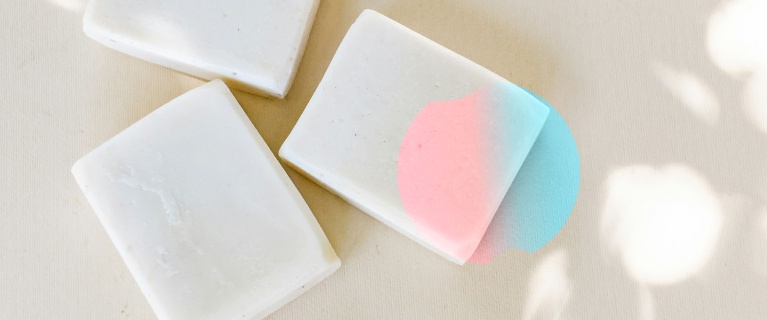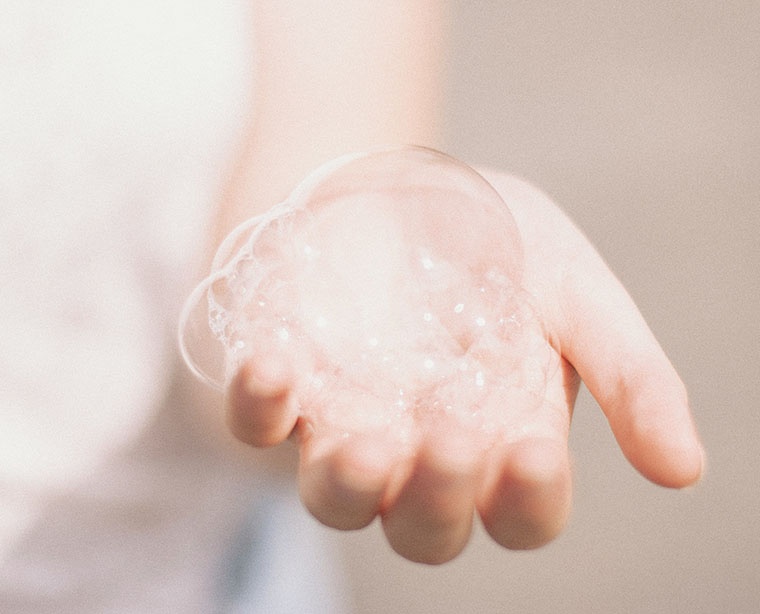

Soap and Eczema

Dermatologists tell us that it's vital for people with atopic eczema to choose the right cleansing products when showering. While good hygiene is essential to avoid infection in the event of skin irritation, the use of non-recommended products can exacerbate existing inflammation. Can you use soap on eczema? Which products are best for cleansing sensitive or irritated skin? Find out from the experts at the Pierre Fabre Eczema Foundation.
Are Soap and Eczema a Good Match?
Contrary to what many people think, the answer is no! Soap and eczema are not a good match. Our specialists will explain why.
What Is Soap? How Does it Differ from Cleansing Products?
Soap is a chemical product obtained from a fatty substance and an alkali (soda or potash) that removes grease and dirt from the skin by making them soluble. It is a detergent surfactant, generally beneficial for personal hygiene, but can be irritating to the skin of some individuals.
The main difference between soap and "soap-free" cleansing products (cleansing oils, shower gels, etc.) is their composition. Soap is a natural detergent, while cleansing products contain milder, non-alkaline synthetic surfactants.
How Can Soap Aggravate Eczema?
The vast majority of eczema sufferers have dry skin. The detergent and stripping effect of soap weakens the hydrolipidic film present on the epidermis, whose role is to prevent skin dehydration, and which is already deficient in atopic individuals. In other words, soap tends to dry out the skin and can therefore aggravate the dryness already present in atopic skin. Fortunately, there are gentler alternatives for maintaining good personal hygiene.
What Is Eczema and What Type of Eczema Is Involved?
To help you understand when you need to apply the following advice, let's take a quick look at eczema. Eczema is an inflammatory skin disease often characterized by the appearance of red, itchy, oozing plaques. There are several forms of eczema, the two most common being contact eczema (an allergic reaction to a product) and atopic dermatitis (genetically determined). The latter is often accompanied by severe skin dryness. Soap and atopic eczema aren’t a good match.
Recommendations for the Choice of Cleansing Products in the Event of Eczema
What gentle cleansing products should you use for eczema? Which cleansing solutions should be avoided? The Pierre Fabre Eczema Foundation has the answers!
What Soaps and Products Should You Avoid?
Soap is not recommended for atopic skin, especially Marseille soap, which is particularly scouring. As a general rule, it is best to avoid products that are too detergent-intensive, such as dish soap and all household cleaning products. We recommend using gloves when handling them.
Scented products are not recommended for those with atopy either, as they can cause irritation and contact allergies.
What Soap-Free Cleansing Products Are Recommended?
For patients with atopic dermatitis, we recommend using a soap-free, fragrance-free, pH-neutral cleansing product with a minimum of ingredients to minimize the risk of allergy. This may be a cleansing cream or oil, a syndet (synthetic detergents) in liquid or bar form, or an extra-rich (lipid-enriched) dermatological soap. Note that organic products are not necessarily the most suitable for atopic skin, as they may also contain allergens (especially when they are plant-based).
Our Practical Advice on Using Cleansing Products for Eczema
In the case of atopic dermatitis, we recommend washing only once a day, taking a shower or bathing in water that's not too hot. Use of the cleanser can be limited to the face, skin folds and anogenital area. If another shower is necessary after physical activity, for example, it's best to use water only, without a cleanser. Finally, remember to hydrate your skin after showering, using an emollient product.
In conclusion, if you have atopy, to avoid further dehydrating your skin, it is best to avoid cleansing with soap and instead opt for gentler, pH-neutral, fragrance-free products. Need more information or advice? Contact a dermatology expert near you.

